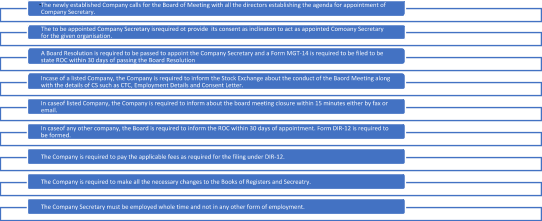This article is written by Hemal Shah who is pursuing a Diploma in Advanced Contract Drafting, Negotiation and Dispute Resolution from Lawsikho.
Table of Contents
Introduction
A Company Secretary is defined under section clause (c) sub section (1) of section (2) of the Company Secretaries Act, 1980 as “who is appointed by a company to perform the functions of a Company Secretary under this Act”.
A Company Secretary is backbone to any organisation with regards to its compliance, ministerial and administrative duties. It is mandatory for every organisation having paid-up share capital of INR 5 crore or more to appoint one. With regards to the modifications of the Companies Act, a Company Secretary hold the position of Key Managerial Personnel, Chief Advisory to the Board of Directors with regards to compliance and any default committed during the respective financial year. They are responsible to ensure that the given organisation is up to date for the statutory compliances and refrain from committing any gross defaults that levies penalties to the Companies.
Who needs to appoint a Company Secretary?
All listed company and all other company having paid-up share capital of Rs. 5 crore or more shall have whole-time key managerial personnel and shall have following whole-time key managerial personnel namely—
- Managing director, or Chief Executive Officer or manager and in their absence, a whole-time director;
- Company Secretary; and
- Chief Financial Officer
Timeline within which a Company Secretary is appointed should be in the first Board Meeting of the newly incorporated company.
Detailed procedure to appoint a Company Secretary
Roles and Responsibilities of a Company Secretary
- A Company Secretary is responsible to attend all the Board Meetings, General Meetings, Extra Ordinary General Meetings and note down the minutes, and keep the members updated about the legal responsibilities.
- Frame and certify Memorandum of Association and Articles of Association and to ensure that the Company functions follows by the MOA and AOA.
- Maintaining various statutory and updating about them to ROC or to such other statutory authorities.
- Complying with the requirements of Stock Exchange,
- Registration of Shares, Assets, and such other liens taken by the company for listed companies.
- Issuing of shares and communicating about the same to shareholders.
- Complying the legal liabilities during capital restructure, Mergers and Acquisitions, converting the private company to a public company and vice versa.
- Corporate Governance.
- Maintenance and appropriate disclosure of Company Records, Signing the Balance Sheet, Statutory books of accounts and registrars. The Company Secretary is ensuring that the dividends are distributed appropriately and the undistributed dividend is not unfairly used by the Company.
- Comply with the requirements of CSR.
- Representation of the Company in various shareholder’s meeting, statutory meeting and such other events where the presentation of the Company’s records deems beneficial.
- Ensuring the safe custody of Company Seal
- Ensuring that all the legal compliances are duly rendered and carrying out administration effectively.
- Such other relevant activities or responsibilities duly required to fulfil.
Contract Drafting- An Important Skill for Company Secretary
Contract Drafting for a large part has been important not only to lawyer but even for Company Secretaries. They are responsible and liable for the majority of the compliances and all the statutory requirements. They play the role of Chief Legal Advisor even to Board of Directors during instances when they want to explain them the legal duties and responsibilities owed by each and every member on the Board. They are assumed to understand the legal jargons and other varied terms as compared to that of a law graduate. They are not only responsible to draft the different set of agreements but also to vet them, in case their company proceeds with either partnership, joint venture activities, mergers, acquitions, converting a private company to a public company or listing the listing the public company.
Since, the above-mentioned lists consists of activities ranging from filing of the documents, to complying with the statutory duties, ensuring about the legal rights and responsibilities owed by the directors of the company, Corporate Governance, Conducting Meetings and authorising the books of the account and such other regulatory duties as including but not limiting to the scope of work.
The Contract Drafting skills allows a Company Secretary to understand legal documents, understand its future implications and follow raise an alarm in case of any friction with regards to the compliance. Looking at the size and the volume of the company, the compliances are day to day in nature and drafting and vetting of them are a part and parcel of the day to day affairs of the company. The Company Secretary may warn the Board of Directors or provide such other alternate suggestions in case of any misfortune caused during the dealings of the parties.
Another important aspect from a practical point of view is that, it is essential to understand that which agreements are required to be on stamp paper and the amount involved for the same. In case, they fail to pay the stamp duty, there are serious offenses related to the same to the Company and since a Company Secretary holds the position as that of Key Managerial Personal, they might also be imprisoned for the offences relating to evading the stamp duty and forgery and cheating.
Top Ten Contracts that a Company Secretary must know
1) Lease Deed
A lease deed is a written contract between a landlord (lessor) and tenant (lessee), which states that the landlord would receive a periodic payment in exchange of allowing the tenant to use and occupy the property. The lease deed also defines the terms and conditions that govern the relationship between a landlord and a tenant during the period of lease. A lease deed is generally required when the property is leased for a long period of time, ranging between 1-5 years or even longer. In such cases, a lease deed plays an important role to govern the relationship between the landlord and tenant and lays down the provisions legally binding over them.
2) Non-Disclosure Agreement
In today’s world to fast paving technology, an NDA plays a very secured agreement as it binds the parties to refrain from disclosing such confidential information as is required during the transaction and after the transaction is duly completed. It also refrains from not only disclosing but also to use the given information in such other activities such as framing decisions based on the data provided by the Company.
3) Inter-Company Loan Agreement
Transferring funds form one subsidiary to another is not unconventional and related party transactions have portrayed enough positive results from those organisations that have managed to shift the funds from one company to another. It basically shifts cash to a business unit that would otherwise experience a cash shortfall.
4) Shareholder’s Agreement
A shareholders’ agreement is an arrangement among a company’s shareholders that describes how the company should be operated and outlines shareholders’ rights and obligations. The shareholders’ agreement is intended to make sure that shareholders are treated fairly and that their rights are protected.
5) Merger Agreement
A merger is an agreement that unites two existing companies into one new company. Mergers and acquisitions are commonly done to expand a company’s reach, expand into new segments, or gain market share. All of these are done to increase shareholder value.
6) Sales and Purchases Agreement
A sales and purchase agreement (SPA) is a binding and legal contract between two parties that obligates a transaction between the two parties: the buyer and the seller. SPAs are typically used for real estate transactions, but they are found in all areas of business. The agreement finalizes the terms and conditions of the sale, and it is the culmination of negotiation between the buyer and the seller.
7) Acquisition agreement
An acquisition agreement is a contract that governs the purchase of one company by another or the merger of two companies. The acquisition agreement is made up of multiple documents including the purchase agreement as well as all documents that are needed to finalize the transfer of the business.
8) Equity Listing Agreement
An equity listing agreement is an agreement between the stock exchange and the company that files an agreement with the company for listing its securities in the manner and the type within which it is described.
9) Share Subscription Agreement
A Share Subscription Agreement is basically a private arrangement between the Investor and the Company that offers the investors to sell shares at a certain price. However, it depends on the company if it wants to have a private placement or public offer.
10) Hypothecation Agreement
A Hypothecation Agreement is an arrangement between the lender and borrower, whereby the borrower pledges the asset as a collateral on a loan without transferring the right, title and interest from one borrower to lender
Conclusion
Company Secretaries hold a vital position in the company, it is essential for them to not only know the skills required for drafting but also understand the interpretation involved with each of legal jargons used. In case of any misunderstanding in the contracts can make the company pay a hefty price.
LawSikho has created a telegram group for exchanging legal knowledge, referrals and various opportunities. You can click on this link and join:
 Serato DJ Crack 2025Serato DJ PRO Crack
Serato DJ Crack 2025Serato DJ PRO Crack











 Allow notifications
Allow notifications


